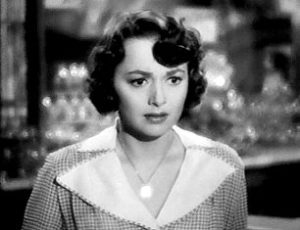Olivia de Havilland died on Sunday, July 26, at the age of 104 in Paris, France.
 One of the last remaining stars of Hollywood’s Golden Age, de Havilland’s storied career produced enough obituary headlines for half the screen actors guild: one of 14 actresses to win (at least) two leading Oscars (Katherine Hepburn, of course, won four); one of the only pair of sisters to both win Oscars; a bitter, lifelong feud with that sister, Joan Fontaine; the female half of an iconic on-screen romantic duo; plaintiff in a lawsuit that helped bring down the studio system; and one of the leads in the movie that, perhaps more than any other, symbolizes Hollywood’s golden era, Gone With the Wind.
One of the last remaining stars of Hollywood’s Golden Age, de Havilland’s storied career produced enough obituary headlines for half the screen actors guild: one of 14 actresses to win (at least) two leading Oscars (Katherine Hepburn, of course, won four); one of the only pair of sisters to both win Oscars; a bitter, lifelong feud with that sister, Joan Fontaine; the female half of an iconic on-screen romantic duo; plaintiff in a lawsuit that helped bring down the studio system; and one of the leads in the movie that, perhaps more than any other, symbolizes Hollywood’s golden era, Gone With the Wind.
De Havilland started at the top, playing Hermia in 1935’s A Midsummer Night’s Dream, the only film directed by legendary theatre director Max Rhinehardt. She was then signed by Warner Bros. and that same year was cast in Captain Blood opposite Tazmanian-born swashbuckler Errol Flynn.
Her demure beauty was the perfect foil for his hormonal swagger and they went on to spark seven more films, including The Charge of the Light Brigade, They Died with their Boots On and, most notably, The Adventures of Robin Hood. She was often cast as second lead to studio powerhouse Bette Davis, a good friend, in frothy comedy (It’s Love I’m After), overripe melodrama (In This Our Life) and even an historical love triangle with Flynn (The Private Lives of Elizabeth and Essex). Then, in 1939, she was loaned to David Selznick for the ultimate second lead, as good-girl Melanie to the vixenish Scarlett O’Hara of Vivien Leigh in Gone with the Wind. Clutching her newborn baby in the back of a rickety old wagon, Scarlett drove her out of a burning Atlanta into an assured place in cinema history.
GWTW trivial factoid #237: When the stars arrived in Atlanta for the 1939 premiere, the band struck up “Dixie.” Exclaimed the very British Leigh, “They’re playing the song from the movie.” Fearing a PR disaster if Georgians learned Scarlett herself had said such a thing, publicists attributed the remark to Olivia. Such are the indignities of a second lead!
As Melanie, Olivia received a supporting Oscar nomination and two years later, she was nominated for best actress for Hold Back the Dawn, losing to sister Joan in Hitchcock’s Suspicion. Still, she felt she was not getting the plum roles she coveted. A battle royal ensued with studio chief Jack Warner and she went to court to break her contract. This led to the de Havilland Decision. At the time, if actors declined a role or were otherwise “difficult,” the studios were contractually entitled to put them on leave and extend their contracts for the length of that leave, effectively stalling their careers. The court ruled this was nothing less than indentured servitude. Olivia was free of Warners and for the rest of his life, Jack Warner became apoplectic at the mere mention of her name.
Her first post-Warners film was the 1946 tearjerker To Each His Own for which she received her first Academy Award. Her career was now at its peak. Two years later, she won the NY Film Critics Award for The Snake Pit, a groundbreaking expose of mental institutions. A year after that, she copped her second Oscar for what many consider her finest performance, as Catherine Sloper in William Wyler’s haunting film of The Heiress.
After that, with a young family and changing times, her career declined. There were age-inappropriate roles (The Ambassador’s Daughter), grotesquerie (Hush, Hush, Sweet Charlotte, again second lead to Bette Davis) and the inevitable all-star disaster film (The Swarm). She even lent her Grande Dame status to TV movies (playing the Queen Mum in 1982’s Charles and Diana: A Love Story). They matter not.
Olivia de Havilland was the last remnant of an era when movies manufactured dreams and she is part of our cinematic dreamscape: Melanie coolly helping Scarlett hide the body of that Yankee scalawag; Maid Marian swooning as Robin rescues her with his daring swordplay; Catherine turning to ice as she tells her aunt “I have been taught by masters.” And my sentimental favorite: John Lund takes her hand at the end of To Each His Own and says “I think this is our dance, mother.” That look in her eyes; it gets me every time.

Leave a Reply